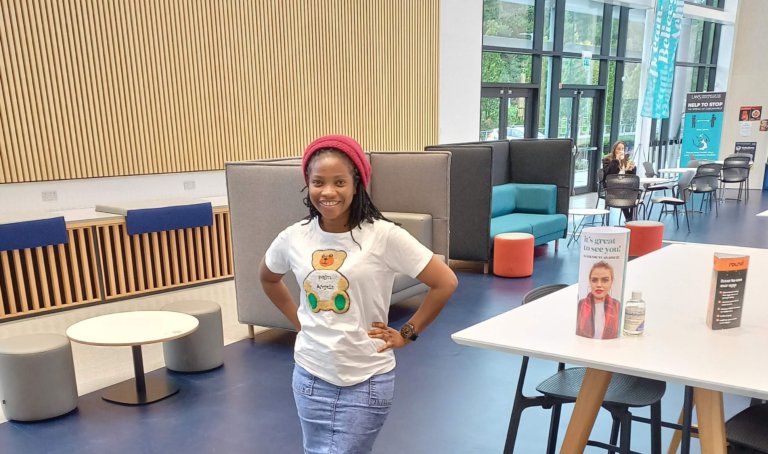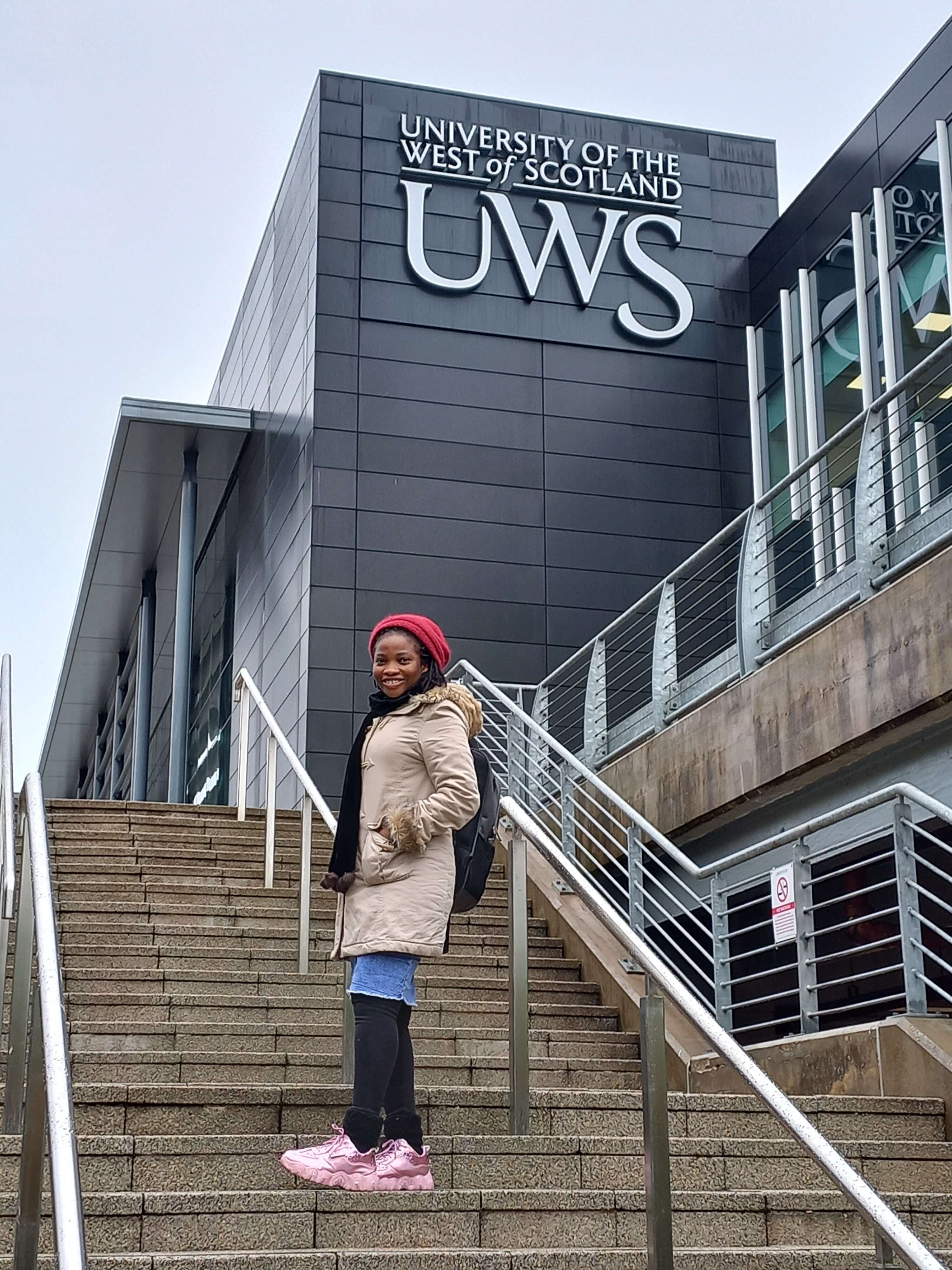
Rejection may be part and parcel of life, but how we react to it is what sets us up for failure — or success. Just ask Mercy Ojetunde. The Nigerian is a recipient of the Commonwealth Shared Scholarship, which is helping her realise her dream of studying abroad. Her resilience and religious faith played a big role in helping her clinch the scholarship.
After multiple rejections, Ojetunde decided to intern at the Nigerian Institute of Medical Research (NIMR) to gain more relevant work experience. This fired her up for another round of scholarship applications. Her efforts paid off when she finally clinched the Commonwealth Shared Scholarship.
Passionate about sciences and understanding how some diseases can be managed and treated using recombinant DNA technology, she decided to pursue her graduate degree in biotechnology. Below, we speak to her about her scholarship application process and what life in Scotland has been like so far:
Is there a story behind your interest in biotechnology?
It all began with curiosity. Biotechnology will provide me with the knowledge and skills needed for excellent scientific research. During my undergraduate programme and internship at the NIMR, I became familiar with scientific terminologies like recombinant DNA technology.
However, I was more interested in the mechanisms behind all of these and how some disease conditions can be managed and treated using recombinant DNA technology. I also had some hands-on training during my internship at the NIMR.

“During my undergraduate programme and internship at the NIMR, I became familiar with scientific terminologies like recombinant DNA technology,” says Ojetunde. Source: Mercy Ojetunde
I still needed to further my education in molecular biology and biotechnology to learn more and get some research ideas. I have a passion for solving problems such as producing intervention products and therapeutics to help curb infectious diseases and future pandemics.
I want to contribute to growth and development globally. From my knowledge and experience, I knew certain genes were responsible for some disease conditions.
I also understand that there can be genetic mutations responsible for various genetic disorders. Still, I was just eager to participate in some of these genetic manipulation experiments which have kept my interest in this subject alive.

“I want to contribute to growth and development globally. From my knowledge and experience, I knew certain genes were responsible for some disease conditions,” she says. Source: Mercy Ojetunde
What made you choose to study abroad in Scotland?
The availability of facilities research is better abroad because of the research space available, funding, stable power supply and resources.
I love science and research and my choice to study in Scotland is due to the nomination I got from my school for the fully-funded Commonwealth Shared Scholarship.
What do you like most about the country?
A lot. The stable power supply, the strong internet connection (this will help me read more and watch relevant videos for studies because there are no concerns about exhausting data), the serene environment, and the fantastic people I’ve met.
Walk us through the application process for the Commonwealth Shared Scholarship?
For the Commonwealth Shared Scholarship, I submitted my applications for admission to some unis in the UK. I then submitted a separate application to the Commonwealth.
The UK government-funded the award in conjunction with UK unis. The process wasn’t easy because I had to make sure my application stood out.
A scholarship application is like competition so I was busy writing essays and editing to put me at a competitive advantage. God helped me because while I was applying, I was also working at the NIMR and my schedules were tight.

“I love science and research and my choice to study in Scotland is due to the nomination I got from my school for the fully-funded Commonwealth Shared Scholarship,” she says. Source: Mercy Ojetunde
What does your Commonwealth Shared Scholarship cover and how does it help?
The Commonwealth Shared Scholarship covers full tuition fees, study travel grant, thesis grant, a monthly stipend and flight fares. In addition, I did not pay visa and health insurance fees because I’m a Commonwealth scholar.
Do you have any advice for prospective applicants on how to manage their budgeting?
Prospective applicants should have the foresight and plan well. You should try to save to pay applications or extra fees. When I applied, I didn’t pay any fees but I would recommend being smart and managing yourself in terms of financial planning.
What about general advice on the scholarship you won?
My advice is to be on top of your game. I applied for other opportunities to study abroad but I couldn’t get it.
Still, I didn’t relent and worked even harder. It’s not easy getting rejected but I had to move on because I have to make my dreams come true.
You should work hard during your undergraduate studies and try to excel in your grades — especially during the end. Engage in activities like volunteering and relevant experiences.
When you take leadership positions and more, you’re working towards producing results and making impacts that will make you stand out. Your dreams are valid and you should never give up.
Above all, God is the master planner. He knows best so for me, prayers with hard work give greater results.
Do you think it would have made a difference if you studied at a local institution?
The difference is very clear. Abroad, there is more exposure and the resources are just readily available. There is a strong internet connection and no worries about data consumption.
I have access to resources and the facilities here are top-notch. To further add, the teaching method here is just amazing.

“For the Commonwealth Shared Scholarship, I submitted my applications for admission to some unis in the UK. I then submitted a separate application to the Commonwealth,” she tells us. Source: Mercy Ojetunde
What has been your most memorable class thus far?
The Nucleic Acid and Protein Technology class has been the most memorable so far because it focused on DNA, RNA, genes, gene cloning, gene editing, gene knockdown, and a lot more. It’s been exciting and I recently started an experiment on gene cloning. The lab activities have been great because I had the opportunity to clone a gene myself.
Can you share a little bit about your hometown with us?
I live in Ogun State in Nigeria. If you visit, I would take you to the Olumo Rock in Abeokuta — a tourist centre and somewhere fun.
What about Scotland, have you explored the region?
Well, I just arrived in Scotland so I’ve only spent a month here and have not yet explored the region. I’ve been to the stores where I bought a few trinkets — the quality of the clothes and products here are excellent.
What’s the local food compared to home like? Share your most and least favourite.
I haven’t tried Scottish cuisine because I stay in the student accommodation managed by a private owner. When I came to Scotland, I came with some Nigerian food and I still have lots. Perhaps I shall venture into trying some of the local cuisines in the next few months.










